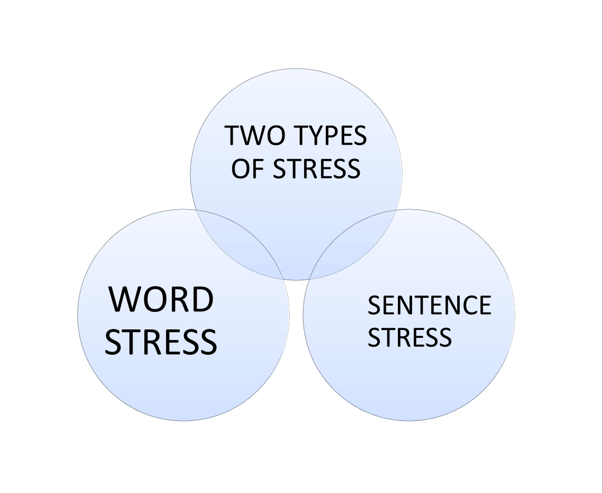
What is stress?
Stress means pronouncing some syllables in a word and the content words in a sentence more strongly than others.
Stress is about contrast.
Pronouncing sentence stress well depends on creating a clear contrast between stressed and unstressed syllables.
You should pronounce stressed syllables or words more clearly, more slowly, and more loudly than unstressed syllables or words.
Native speakers of English listen for the STRESSED syllables and words, not the weak ones.
Pronouncing sentence stress correctly will make a big difference to how you pronounce English and will improve your comprehension. You’ll immediately sound clearer and more natural when you speak English.
Portuguese, French, Italian, and Spanish are described as SYLLABLE-TIMED LANGUAGES, which are languages that take approximately equal amounts of time to pronounce.
English, German, and Dutch are described as STRESS-TIMED LANGUAGES, where the stressed syllables are said at approximately regular intervals, and unstressed syllables shorten to fit this rhythm.
Pronunciation: stress and intonation and Stress and intonation: quais palavras enfatizar are the two introductory lessons. Review them if necessary.
Now, listen carefully to the following video and take notes. It will help you to understand what sentence stress is in English pronunciation. It will help you recognize and pronounce stress correctly in a sentence and how it can change the meaning of a sentence.
Sometimes, one idea in your sentence is more important than others. You’ll add extra stress to this idea.
Read the full script and test your understanding of the lesson with a quiz.
Sentence stress is flexible, and the line between content words and grammar words isn’t fixed. So there are the most probable ways, but there are other possibilities. It depends on the meaning you want to express.
- Content words – words that give you the meaning of the sentence are usually stressed.
- Structure or grammar words – words that don’t carry meaning are usually unstressed. They’re grammatically necessary; they connect the content words together.
Content words – stressed
| Words carrying the meaning | Example |
| Main verbs | SELL, GIVE, EMPLOY |
| Nouns | CAR, MUSIC, MARY |
| Adjectives | RED, BIG, INTERESTING |
| Adverbs | QUICKLY, WHY, NEVER |
| Negative auxiliaries | DON’T, AREN’T, CAN’T |
Structure words – unstressed
| Words for correct grammar | Example |
| Pronouns | he, we, they |
| Prepositions | on, at, into |
| Articles | a, an, the |
| Conjunctions | and, but, because |
| Auxiliary verbs | do, be, have, can, must |
You can add extra stress to a word if you want to:
- emphasize one particular idea,
- contrast two ideas,
- or to correct or contradict someone else.
Conclusion
- You do not need to hear every word to understand the meaning of a sentence. If you focus on listening to the stressed words, you can understand what someone means even if you do not hear the unstressed grammar words.
- Pronounce the stressed words more strongly, clearer as possible, and pronounce the unstressed words at a lower volume and as fast as you can, like a weak pronunciation.
- Pay equal attention to the unstressed words, and try to get a clear contrast between the stressed and unstressed words.







